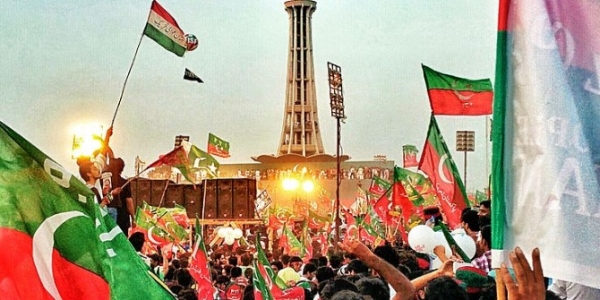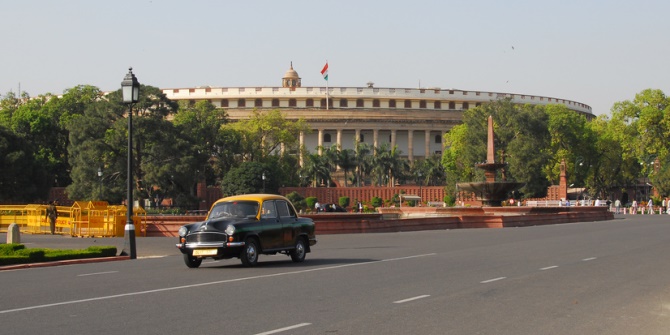 Hamzah Rifaat Hussain examines the challenges of the year ahead for Pakistan’s main political parties, including the threat of extremism, as the country continues its democratic transition.
Hamzah Rifaat Hussain examines the challenges of the year ahead for Pakistan’s main political parties, including the threat of extremism, as the country continues its democratic transition.
2018 is an important year for Pakistan. Not only will it mark the second transition from one democratically elected government to another, but will also provide a likely showdown between three of the country’s main political parties. Campaign rhetoric has already kicked off and the conservative PML N (Pakistan Muslim League (Nawaz)) which is grappling with the Panama Papers case against its chief will be pitted up against the Pakistan Tehreek I Insaaf, the very party which initiated the proceedings against the former in the first place and champions the cause of accountability. On the other hand, the progressive, leftist Pakistan People’s Party which has its main vote bank in Sindh, is also looking to cash in on the PML N’s defiance of the judiciary as well as make up for its losses from 2013. Their 50th anniversary which was celebrated with full pomp in the capital Islamabad adds symbolic significance to their rhetoric and show of power.
While this is all set to be a showdown of considerable proportion, the worrying trend which is coming to the fore in the lead up to the elections, is the rise of far right extremism which was manifested in the capital, Islamabad as well as the mainstreaming of fringe elements. The recent protests over a controversial amendment in the Electoral Bill of 2017 which had subsequently been rectified, became a stark reminder, that democratic transition in Pakistan without pandering to the demands of the clerics will be anything but smooth. The ability to paralyze the capital of a nuclear weapons state for 20 days and threatening to overthrow the government, only for the latter to strike a deal with them to end the chaos is a damning indictment.
The power wielded by the clerics who protested on the highway junction in Islamabad belongs to the Barelvi school of thought in Islam, which acts as a potent threat to the PML N government, drawing heavy support from these fringe elements during the 2013 elections. The sensitivity of the issue which in many ways was mishandled, has resulted in the mushrooming of groups which are opposed to the ruling government and will play a significant part in attracting voters, breaking vote bases in constituencies or even attempting to derail democracy if their concerns are not taken into consideration. With its power based slowly eroding, The PML N is witnessing an upsurge of voices calling for their accountability, better governance and upholding democratic traditions. The role of the military which acted as a mediator to deflect the Islamabad crisis is indicative of the sensitive position that the ruling government found itself in.

The Pakistan Tehrik-e -Insaf political rally. The rally was held to show the support of the common man against the vote rigging in the previous national election. Image credit: CC BY-SA 3.0.
Much of this upsurge of castigation can be explained in light of the PML N’s own detrimental actions and policies. Its defiance of the judiciary, the hearings at the National Accountability Bureau and muzzling out opposition voices have resulted in a political landscape whereby the opposition, the military, and clerics have all turned against them. Unlike the political acumen of the Pakistan People’s Party which is known for its ability to uphold democratic traditions by taking all stakeholders on board, the PML N has been openly defiant.
Questioning the judiciary, sensing a political conspiracy by the military to overthrow the government, and not attending the hearings of the National Accountability Bureau, are quite a few takeaways which will hurt the ruling government’s chances in the upcoming elections. With the media revolution in Pakistan, every move is being scrutinised, debated, discussed and understood by a plethora of political analysts, experts and opinion makers. The breathing space for the ruling government is shrinking. The more alarming fact however, is the mainstream presence of fundamentalists who had challenged and are challenging the authority of a civil government.
This does not bode well for Pakistan, given that it is a state with a history of democratic fragility and while the possibility of an election transition being hijacked is remote; continuous turmoil and the rise of the far right is frightening. For any Pakistani, continuously protesting against the PML N over a plethora of issues will count significantly in the lead up to the elections. The role of the media and the opposition and efforts to muzzle out the far right is important for the citizenry of a nuclear weapons state to pass this litmus test of democratic transition. The need for more informed debates; understanding the role of religion in becoming a unifying force instead of a polarising one; and ensuring that a fragile democracy is not held hostage to a few thousand individuals hijacking the country, is critical. Pakistan is also a land where voter preferences are based on clientele politics, coercion as well as ethnicities. Barring the elite which reside in urban areas such as Islamabad or Lahore, the vast majority of the population is vulnerable to exploitation from those who often champion the cause of religion to secure their own vested interests.
2018 will be a challenging year but the litmus test of democratic transition in Pakistan must pass.
Note: This article gives the views of the authors, and not the position of the South Asia @ LSE blog, nor of the London School of Economics. Please read our comments policy before posting.
About the Author
 Hamzah Rifaat Hussain is an anchor in Current Affairs for PTV World, Pakistan’s only English news channel, and a former visiting faculty member at the National University of Sciences and Technology’s School of Natural Sciences. His writings explore political and internal security issues in Pakistan and he is a regular contributor to Diplomat magazine. He tweets @MonolithicAmz.
Hamzah Rifaat Hussain is an anchor in Current Affairs for PTV World, Pakistan’s only English news channel, and a former visiting faculty member at the National University of Sciences and Technology’s School of Natural Sciences. His writings explore political and internal security issues in Pakistan and he is a regular contributor to Diplomat magazine. He tweets @MonolithicAmz.







